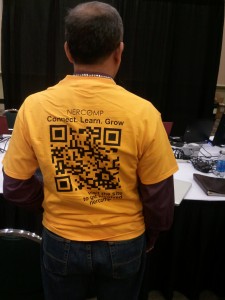 I attended yet another excellent NERCOMP annual conference from March 12-14. I am not saying this simply because Wellesley was very well represented and all of our presentations were VERY well received 🙂 It is a small enough conference where you can establish long lasting partnerships and catch up with others on what is going on. We all wore color coded T-shirts with QR code strategically placed on the back and because the theme was Mardi Gras, wore some beads! “Gold color” represented power – I am a Board member 🙂
I attended yet another excellent NERCOMP annual conference from March 12-14. I am not saying this simply because Wellesley was very well represented and all of our presentations were VERY well received 🙂 It is a small enough conference where you can establish long lasting partnerships and catch up with others on what is going on. We all wore color coded T-shirts with QR code strategically placed on the back and because the theme was Mardi Gras, wore some beads! “Gold color” represented power – I am a Board member 🙂
I was part of a leadership forum on Monday where we discussed a paper by Clayton Christensen called “Disrupting College“. It is a long 70 page position paper where, Christensen argues that disruptive technologies, especially online learning, should be adopted by the academia soon as a way to reduce the cost of postsecondary education while not compromising on the quality. It is a very interesting read. He also agrees that what he proposes may not be directly applicable to many of the elite institutions, however, not keeping on top of it and developing strategies is highly recommended.
I agreed that these disruptions are real and we need to be watchful and that these are unlikely to affect everyone the same way. Students go to the Colleges and Universities for the best possible academic experience with the intent of getting a good job. However, they also come there for the complete College experience that includes interactions with the peers, athletics etc. Therefore the model of online only education is not likely to be applicable for everyone equally. Secondly, every College and University, no matter how “endowment rich” they are, face economic realities of increased healthcare costs, facilities maintenance costs, and cost of implementing increasing number of governmental regulations and compliance requirements and it is not clear how cost containment or reduction can be achieved without addressing all of these. I know that there is an outcry about the cost of education (I am experiencing it first hand right now). However, if you ask me how much do I think the education in a prestigious University is worth that I am willing to accept, I will be at a loss to answer that question. I think we need to know this so we can look at the institution’s budget to see if it is realistic to be able to get there, if so, develop a plan to get there. If not, come up with an alternate plan which says how much reduction is actually achievable. My gut feeling is, unless the market forces demand it (such as students not applying to go to certain colleges because of cost), institutions are less likely to do it, because the only way to achieve reductions of substance will be to take highly unpopular decisions affecting the culture of the place. This is not something anyone wants to do.
I also gave a talk on how the CIO job is all about trying to solve a complex math problem – constrained optimization. I had already given this talk to the science faculty here and it was well received, so I repeated most of it at NERCOMP. Given that my talk was at 8:15 in the morning on the opening day, I was pleased to see a room full of audience. It went really well. We had similar well attended talks from Wellesley – David O’Steen talking about our transition to Google, Maureen Williams and Eddie Stumpf talking about Mobile Apps and a poster on Drupal transition by Veronica. In addition, I jointly presented on NERCOMP analytics, something I have been doing for the organization as a Board member – how can we use existing data to help drive the agenda of the organization. This was an online presentation attended by over 40 members.
I learned a fair amount by talking to the attendees as well as some of the vendors. Bottom line is that we are doing great things, some of which are the envy of our peers. The sheer speed with which we are able to accomplish things baffles them. I pointed to a great group of faculty, staff and students in the LTP Committee and their support as an important factor in all of this and how the LTS staff have worked very hard to deliver on these projects.
The highlight was David Pogue’s talk on Disruptive Tech: What’s New, What’s Coming, and How It Will Change Everything. If you want to get a sense of what David’s talks, you can watch a snippet here. There was really nothing new in the talk, but he was very funny and the images and videos he showed were really funny and he was very engaging.
One major takeaway from the conference from me was how blogs are becoming an excellent tool for senior leadership to communicate their ideas. However, it cannot be a Treadmill. In other words, it cannot be one where the initial enthusiasm increases its use, but then it dies down. Recently I have been so busy that the treadmill analogy was becoming true – the intent was there, but couldn’t find the time. I am committed to changing that…